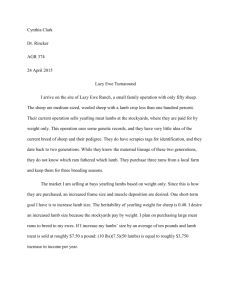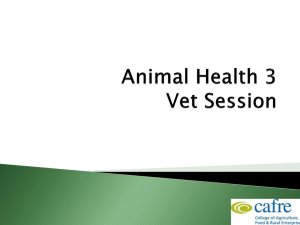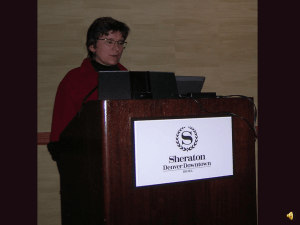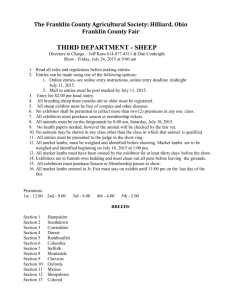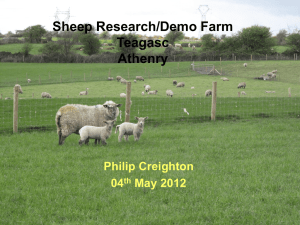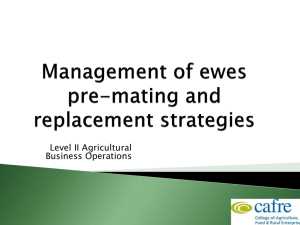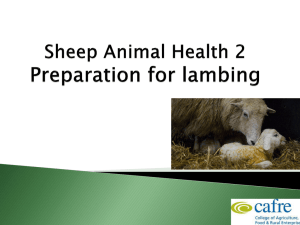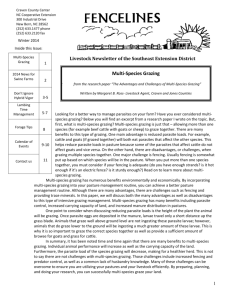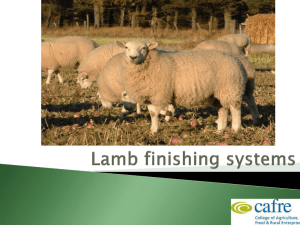Suggested guidelines for a healthy growing a showing season
advertisement
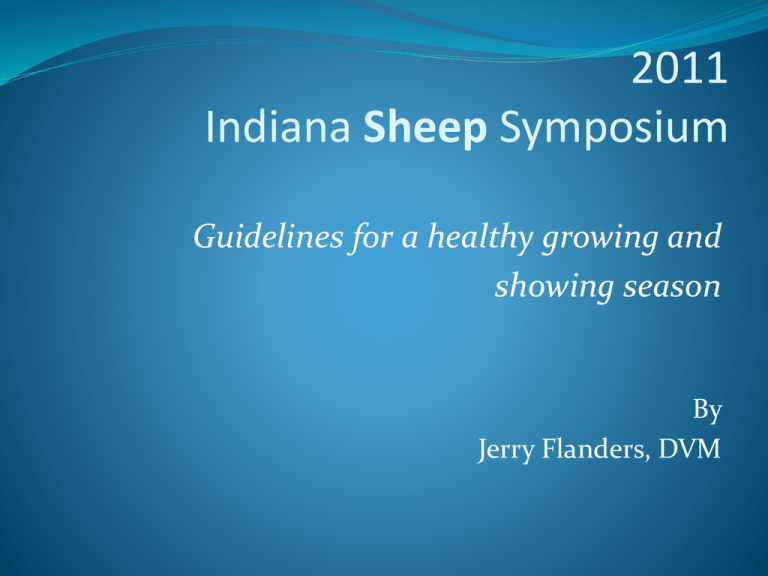
2011 Indiana Sheep Symposium Guidelines for a healthy growing and showing season By Jerry Flanders, DVM Where do I start? Lamb Camps and workshops Establish a client patient relationship with a local veterinarian Network: through the Internet Breeders Animal HealthCare/ veterinarians Lamb Buyers Feed Salesman 4-H Familes Set your goals Define who you are Breeder/Producer Owns rams & ewes lambs them out Part-time breeder/ buyer Owns ewes and lambs them out off site Club Lamb circuit participant The die hard showmen that show most weekends County/State fair participants Target lambs for certain shows Breeder Profile VIP Club Lambs Health Protocol Pre-breeding season (May-July) open females/rams Shear ewes and rams for summer pastures Deworming, cydectin cattle pour-on as an oral drench 1cc/22 lbs Vit A/D 2cc SQ, Bo-Se 5cc/200lbs SQ Chlymidia 2cc SQ and Foot-vax 1cc SQ Breeding season (July-Aug) rams out of site 30 days prior season Semen check rams before breeding season Insert VIPs for planned breeding season for 2 wks Flush ewes with corn Avoid moving ewes or deworming ewes during the first trimester monitor breeding marks of rams Breeder cont… Late gestating Ultrasound ewes (Oct-Nov) Vacc bred ewes (nov-dec) 2cc CD/T SQ, 1cc Nasalgen IN (Intranasal), 10 cc cydectin pour-on as a oral drench, footvax 1cc SQ, Vit ADE 5cc SQ Vacc/Injections are very stressful Start on grain mix with coccidiostat with tetracycline 60 days prior to lambing Rumensin –vs- Dequonate Be consistent ewe and creep feed Breeder cont….. Lambing season (Dec-Mar) Newborns 4 oz Colostrum orally, 1/4cc nalagen IN , Wound- Coat unbilical spray, 1cc Vit B complex SQ, 3cc Baby Lamb Strength orally Ewes post partum in the lambing Jugs Check teats/udder for mastitis or hard bag Strip teats and harvest extra colostrum for freezing and storage 4oz snap bags Wet graft lambs if needed Make sure ewes clean out after birth Uterine flush with diluted tea colored iodine with warm water Lambs 3-7 days old Band tails, castrate, 1cc Bo-Se SQ, 1cc VitAD SQ, 1cc Pen 48 SQ, tag Nursing lambs Set up creep area with a heat lamp Set out leafy alfalfa hay, creep feed top dress with some ewe feed Have clean water accessible to lambs Set out mineral and salt to get lambs to start drinking water Vacc 1st CD/T around 4 wks 2cc SQ right sternum Vacc CD/T booster 8-10 wks 2cc SQ left sternum and Vacc ½ cc nalagen IN Creep Feed Selection criteria Texture vs Pelleted 18 to 20% CP Coccidiostat: Rumensin or Dequinate Medicated: AS700 minimize coughing and diarrhea Roughage grass-vs-alfalfa Lamb buyer Profile Purchase lambs off the farm or breeder out of lamb auction sales off of a lamb broker Health guidelines need to be established and standardized Lambs are often stressed could have a weakened immune system. Spring Time - Health Concerns Systoms- Coughing, runny noses, diarrhea, rectal prolapses, soremouth, fungus, barn mites. Causes- Weather changes, overcrowding, stress in sheared/chilled lambs, mixing of new lambs, overeating of feeds and or new feeds, soiled/moist bedding, poor biosecurity. Preventative Health guidlines Isolate new lambs in small groups for 2-3 wks Update vaccines/shots Nalagen 1cc IN per lamb, CDT booster 2cc SQ, Vit AD 2cc SQ, Bo-Se 1cc SQ • Deworm (ie cydectin) Sulmet powder in drinking water for 1 wk Coccidia and antibiotic shipping fever treatment Treat sheared lambs with Lyme Sulfur Dip Establish new show feed and gradually bring on to feed. Always wash hands, clothes, and shoes before and after handling different groups of animals Establish CPR with a Veterinarian CPR – client patient relationship Farm calls can be costly and hard to come by Hauling the animal is usually cheaper and more convient for the vet Transport in large dog crate is an option Phone health consultations Establish a home pharmacy for common veterinary medicines Share products/costs with neighbors Ask if the product can be frozen and/or made into smaller portions. Know your Pharmacology most of these are off-label use in sheep Steroids, Nsaids, and Antihistamines These are different types of anti-inflamatories that are commonly added to the antibiotic to medicate bacterial and/or viral infections Works in similar ways but have specific actions and treatments for pain, fever reducer, and inflammation of cells Steroids: Dexamethasone, Pre-def, Vetalog, Nsaids (nonsteroidal antinflamatory drugs): banamine, bute, naproxine, asprine Antihistamines: Recovr, Histovet-P, benedryl, Pharmacology cont Antibiotics: treats bacterial infections Cidal drugs: kills the bacteria in the body Penicillin, naxcel, nuflor, draxin Static drugs: holds the bacteria stagnant until the body overcomes the bacteria Tetracyclines, sulfas, gentamycin These are commonly given as injections, oral meds added to the feed or water, or topically Respiratory Tx cocktail Clinical Signs: coughing/nasal discharge Excede or Daxin (1cc/45lbs) 1 treatment for 7days PLUS Predef or dex (1cc/50lbs) 1 treatment for 7 days PLUS Re-covr (1cc/20lbs) treat daily for 3 days Vit B complex 2cc daily for 3 days Ringworm the dreaded parasite? Fungal Tx: Club Lamb Fungus Know what to look for early signs verses large ringworm lesions Prevention tx Lyme Sulfur Dip – spray down lambs after show Most effective way to prevent outbreaks and fly bites Chrolohexidine Topical tx OTC Antifungal tx (chlotrimazole, lamasil) Captan – rose fungus tx Environmental Tx Tilt (wheat fungicide) 1 fl oz per gallon water and use a weed sprayer Spray down feeders, gates, waters, halters Common DDX: Staph sp, mites, fly bites Diarrhea where did that come from? Stress and/or changing feeds Is it bacterial or parasitic Always best to deworm again every 2-3 weeks Have clostridium CD anti-toxin on hand Treat 20cc SQ and 20 orally just in case Pepto is useful to coat GI tract decrease food and water for 12 hrs Hand feed grass hay with Vit B Complex till firm stool and normal appetite Coccidiosis Run a fecal before any treatment Preventions Drinking water low doses Corid and Sulfaved Coccidiostats in feeds Rumensin, Dequinate Will not treat active infections When changing feeds with different coccidiostats often will cause an outbreak so you need to treat with a water tx and deworm at the same time. Treatments Corid depletes thiamine from the body and will need to tx with vit B complex Sulfaved Sore mouth on your Lambs What do I do? Common in young lambs or < 1 year old Scabs around mouth – Pox virus Last 4-6 wks duration – no treatment Orf vaccine for prevention Possible to cause malignant orf Let it spread b/t lambs nose-to-nose Bringing in new groups or individual lambs Possible human zoonosis Wash hands with soap and water Rectal Prolapse Common in short tail docks Highly Genetic Rams & offspring Chronic Coughing Treat with effective antibiotics Vitamin E deficiencies Treatments Purse string and Iodine Injection Rectal tube and banding Is it Scald or Rot? Sore feet and limping sheep Wet conditions in common gateways, barn doors, or bedding is the source of infection Bacteria is the cause Foot Scald is infection in-between the hooves Foot Rot is infection in the sole of the hoof Treatment: trim feet, foot baths, injectable antibiotics, topical treatments Prevention: remove wet areas and replace with stone, FootVax – possible knots Urinary Calculi Bladder stones or crystals Common in wethers Caused by improper balance of Ca:P 2 to 1 Concentrate feeds Alfalfa –vs- Grass hay Can be fatal – veterinary assistance ASAP Treatment- cut off urethral process, drench with apple cider vinegar to dissolve the stones Know your Home Pharmacy Medications Proper storage, refrigeration, light sensitivity, withdrawal times, label dosages, expiration dates Record date, animal ID, drug, dose/method, withdrawal time and site given for what specific problem 3/18/10, tag 310, Draxin, 2cc SQ, R neck, 18 days, for coughing Syringes Disposable single use –vs- clean reusable syringes Common useful sizes: 3cc, 12cc, or 20cc Needles Diameter - 14, 18, 20, & 22 gauge (largest to smallest) Length ¾, 1, and 1.5 inch Always use a clean needle when pulling up the antibiotics Trade off needles b/t drawing up meds and injecting animals Caution used, bent, spurs, and/or broken needles Proper disposal Sharps container or empty heavy plastic jugs Preventative medicine Isolate new arrivals 2-3 wks Nasalgen- viral pneumonia vaccine Booster CD/T, Vit A/D, Bo-Se Deworm with Cydectin every 3 weeks Lyme Sulfur Dip Sheared Lambs Proactive animal health care leads to healthy growing and show season
